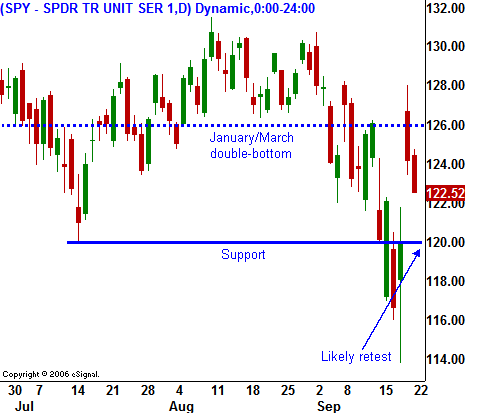Massive Bank Bailout Prevents Crash – Problems Continue – Stay Short!
Last week, the market suffered a heart attack that could have been fatal. At the last minute, the Fed resuscitated financial stocks with a $700 billion bailout plan. The timing could not have been worse for short-sellers as they scrambled to covered positions hours before option expiration.
This crisis came dangerously close to a meltdown. It was poorly handled by the Fed. First of all, the Fed made it clear that it was not going to bail out Lehman. The systemic risk from that decision was taking affect just as AIG was about to go under. The Fed was willing to let that happen, but a series of evaluations forced them to reconsider. They were able to gauge the effects of the Lehman collapse and it was much greater than expected - AIG posed a much greater threat. They stepped up with capital and stripped shareholders of most of the equity. AIG was solvent; it simply needed time to generate cash. The Fed's action created panic and many financial stocks were down 30% overnight. They finally made an announcement Thursday afternoon.
If the Fed had simply let the market know that a bailout was possible, the market would not have plunged like it did. Short sellers would have been passive and financial stocks would have rallied on the news. Instead, the market assumed that they would allow others to fail and shareholders in AIG and LEH were wiped out.
Huge market declines destroy confidence and even though market rebounded, investors will be slow to return. Sovereign funds have been a huge source of capital and they are reluctant to invest. The perception is that the Fed is either reckless, or they don’t have a clue – neither is good. This bailout could require upwards of $1.8 trillion and foreign investors are diversifying away from the US. They still have huge exposure here, but they are not interested in adding to it.
In 12 years (2020), 100% of our national budget will be spent on interest (national debt) and entitlement programs (social security). Think of it, there is nothing left over for all of the other necessities! That projection was before this massive bailout and we are less than 12 years away. As a nation, we are headed for trouble and the world no longer wants to finance our gluttonous ways.
We survived a heart attack, but we are far from healthy. The U.S. Treasury will be purchasing mortgages from troubled financial institutions. One out of every 10 homeowners has negative equity and that condition will take years to reverse. The unemployment rate continues to climb and tight credit conditions will slow domestic and global growth. Banks will be highly scrutinized and profits will decline as tight lending practices are introduced. Morgan Stanley and Goldman Sachs are now under the "bailout umbrella". Their profit margins will decline, but they have survived.
I hate that US taxpayers have to pay for poor regulatory supervision and negligent lending practices. However, a financial collapse would have been unbearable. I don't think that any of us can truly imagine the hardship that would have followed.
Last week's rally was largely due to short covering. Once the dust settles, I believe an orderly decline was set in. Financial institutions have mountains of crap on their balance sheets and now that the government is involved, we will eventually determine how bad the problem really is.
The SPY is below 126 - stay short.


Daily Bulletin Continues...

